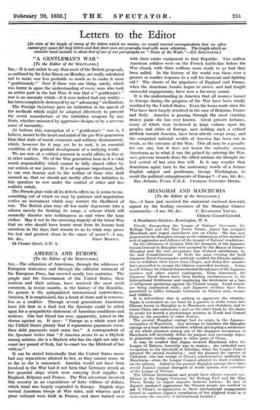AMERICA AND EUROPE
[To the Editor of the SPECTATOR.] Sza,—The education of Americans, through the addresses of European statesmen and through the editorial comment of the European Press, has covered nearly two centuries. The people and the Government of the United States, their motives and their actions, have' received the most acrid comment, in recent months, in the history of the Republic. Its genesis is the unliquidated international indebtedness. America, it is emphasized, has a heart of stone and is remorse- less as a creditor. Through several generations Americans have felt that in a final test the Spectator could be relied upon for a sympathetic statement of American conditions and motives. Our last friend has now, apparently, joined in the chorus- against us. It says " Europe as a whole must tell the United States plainly that if reparations payments cease, then debt payments must cease too." A correspondent of the Spectator writes that " if America seems to us a Shylock among nations, she is a Shylobk who has the right not only to exact her pound of flesh, but to exact too the lifeblood of her
victias." - - • -
It can be stated historically that the United States never had any reparations allotted to her, so they cannot cease, in so far as she is concerned. America would not have been involved in the War had it not been that Germany struck at her peaceful • ships which were carrying food supplies to England, Belgium and France. The War adventure involved this country in an expenditure of forty billions of dollars, which total was largely expended in Europe. English ships 'arried• American troops at War rates, and Wharves -and -a great railroad were built in France, and since turned over
with their entire equipment to that Republic. Two million American soldiers were on the French battle-line before the War closed, with three millions more ready to go had they been called. In the history of the world was there ever a greater or readier response to a call for financial and fighting aid ? The cheers of the populaces of England and France, when the American Armies began to arrive, and had fought successful engagements, have now a far-away sound.
It is the understanding in America that all moneys loaned to Europe during the progress of the War have been wholly remitted by the United States. Even the loans made since the War have been largely remitted in the case of Belgium, France and Italy. America is passing through the most crushing money panic she has ever known. Great private fortunes, many of which were bestowed in large volume upon the peoples and cities of Europe, now holding such a critical latitude toward America, have been utterly swept away, and the computed national wealth of America has been cut in twain, as the outcome of the War. This all may be a penalty for our sins, but it does not lessen the curiosity among Americans as to what it was she gained by entering the War, save grievous wounds from the allied nations she thought she had served of her own free will. Is it any wonder that Americans again turn to the cautionary words of a former English subject and gentleman, George Washington, to avoid the political entanglements of Europe ?—I am, Sir, &e.,






































 Previous page
Previous page